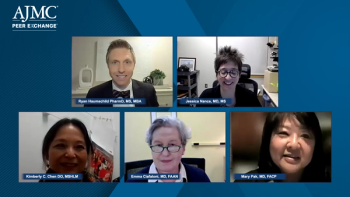
Experts delve into the fundamentals of gene therapy, covering in vivo and ex vivo methods, and explore cellular function targets for effective treatment of a disease.

Experts delve into the fundamentals of gene therapy, covering in vivo and ex vivo methods, and explore cellular function targets for effective treatment of a disease.

Jessica Nance, MD, MS, discusses maximizing gene therapy efficiency by selecting vectors for gene size, tissue targeting, and low exposure, and focusing on precise promoters for expression.

Emma Ciafaloni, MD, FAAN, describes the key differences among viral vectors used in gene therapy, highlighting their applications and strengths in targeting specific diseases.

Kimberly C. Chen, DO, MSHLM, dives into the role of genetic testing in identifying patients eligible for gene therapy and explores coverage criteria, clinical validity, and utility considerations crucial for payers and managed care executives.

Ryan Haumschild, PharmD, MS, MBA, and Mary Pak, MD, FACP, consider FDA-approved gene therapies for hemophilia, spinal muscular atrophy, and Duchenne muscular dystrophy, exploring their genetic foundations, the FDA approval process, and considerations for therapeutic value and cost.

Emma Ciafaloni, MD, FAAN, explores the groundbreaking approval of onasemnogene abeparvovec-xioi for spinal muscular atrophy and its impact on the treatment paradigm for this rare disease.

Emma Ciafaloni, MD, FAAN, dives into the latest developments in gene therapy for muscular dystrophies, focusing on Duchenne muscular dystrophy, and discusses challenges, genetic causes, and the transformative potential of gene therapies.

Jessica Nance, MD, MS, reviews the data and evidence that led to accelerated approval of delandistrogene moxeparvovec-rokl for the treatment of ambulatory pediatric patients aged 4 through 5 years with Duchenne muscular dystrophy (DMD) with a confirmed mutation in the DMD gene.

Jessica Nance, MD, MS, discusses the significance of surrogate end points, like functional assessments, in clinical trials of treatments for Duchenne muscular dystrophy and their implications for clinical benefits.

Experts discuss the landscape of treatment options for Duchenne muscular dystrophy, examine the benefits and risks of gene therapy and conventional steroid treatments, and emphasize the need for early intervention and comprehensive care.

Emma Ciafaloni, MD, FAAN, and Jessica Nance, MD, MS, discuss promising developments in gene therapy, highlighting long-term efficacy, enhanced target effects, and the potential impact of early screening on treatment outcomes for genetic diseases.

Kimberly C. Chen, DO, MSHLM, and Jessica Nance, MD, MS, discuss clinical evidence requirements, pricing considerations, and innovative financing models to provide sustainable coverage for the growing pipeline of gene therapies.

Health care professionals discuss the challenges related to developing and interpreting clinical data for rare disease therapies to guide payer coverage decisions.

Ryan Haumschild, PharmD, MS, MBA, leads a discussion on factors that influence coverage of non-oncology gene therapies, exploring the balance between long-term cost savings and high initial prices, patient selection, and the durability of effect for these therapies.

Kimberly C. Chen, DO, MSHLM, discusses subscription models and warranties for cell and gene therapies, exploring their impact on patient access and financial sustainability.

Jessica Nance, MD, MS, and Emma Ciafaloni, MD, FAAN, discuss ethical dilemmas, exploring how patient subgroup restrictions on orphan drugs can impact access and cost control.

A panel of experts discuss improving collaboration between health systems and managed care organizations to ensure optimal outcomes for patients with rare diseases.

259 Prospect Plains Rd, Bldg H
Cranbury, NJ 08512
© 2025 MJH Life Sciences®
All rights reserved.
